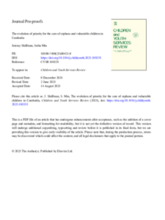In Cambodia, as elsewhere, many orphans and vulnerable children (OVC) are at risk for abuse and neglect. This article analyzes the evolution of national initiatives to care for and protect OVC. Four factors have shaped the evolution of the OVC care system: the restoration of political stability from the early 1990s; the emergence of pressing OVC issues, especially illicit intercountry adoption and orphanage tourism; calls from international agencies to prioritize child protection; and the gradual embrace of the issue by parts of the Cambodian state. Cambodia now has a robust set of OVC care policies on the books. However, priority and implementation require strengthening. Low government priority is due especially to weak demand from civil society and competing items on the government agenda. Weak implementation is due particularly to poor coordination among government agencies and lack of capacity at sub-national levels. Proponents for OVC care in Cambodia will need to address three challenges to strengthen priority for and governance of OVC care. First, the coalition of actors concerned with OVC care in Cambodia needs to push to expand priority well beyond the ministry where such priority is concentrated. Second, international agencies should calibrate support for the issue, ensuring that as they continue to promote child protection initiatives, they do not disincentivize state action. Third, OVC care proponents need to press the state to develop policy and capacity to address underlying drivers of child risk, such as poverty, migration and drug and alcohol abuse.

